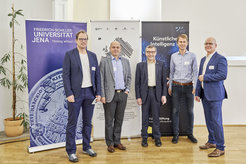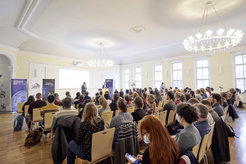Jena in the Champions League for Environmental AI and Machine Learning
The Friedrich Schiller University Jena, the Max Planck Institute for Biogeochemistry and the German Aerospace Center jointly inaugurated the ELLIS Unit Jena – an AI research hub to tackle global environmental challenges. It is one of the newest members of the network ”European Laboratory for Learning and Intelligent Systems” (ELLIS), and is at the forefront of using artificial intelligence (AI) to tackle global environmental crises, like climate change and biodiversity loss. By using machine learning (ML) and AI, researchers gain a deeper understanding of the interdependencies of Earth and climate. They can simulate scenarios for mitigating and adapting to the impacts of climate change.
On January 12th, 2023, the ELLIS Unit Jena hosted its kick-off at the Friedrich Schiller University Jena. This event brought together more than 140 leading experts in the field of artificial intelligence (AI) and machine learning (ML) for Earth and climate sciences, to share insights in recent findings.

The event was opened by Thuringian State Secretary for Research, Innovation and Economic Development, Dr. Katja Böhler; the President of the Friedrich Schiller University Jena, Professor Walter Rosenthal; the General Manager of the Chamber of Commerce and Industry East Thuringia Peter Höhne; ELLIS President and Frontiers of Knowledge Award winner Professor Bernhard Schölkopf (Max Planck Institute for Intelligent Systems, Tübingen). Several presentations and poster sessions by renowned researchers from a dozen world-class research institutions and universities enriched the conference program. Professor Yoshua Bengio (Université de Montréal), winner of the so-called Nobel Prize in Computer Science (A.M. Turing Award), emphasized in his keynote speech the ethical responsibility that AI will have in the future, citing the topics of environmental research as outstanding possibilities.

“AI is one of today’s most groundbreaking technologies. Its potential for helping with the climate and biodiversity crises seems infinite, e.g. for early warning systems, sustainable resource use or detection of climate extremes and their impacts,” says Professor Markus Reichstein, Director of the Max Planck Institute for Biogeochemistry in Jena and Co-director of the ELLIS Unit Jena. “I am glad to see that we are already on the map of Europe’s most excellent research units for environmental AI. With the support of the Carl-Zeiss-Stiftung, the Friedrich Schiller University Jena, and the EU commission, this will only grow in the future.” Joachim Denzler, Professor at the Friedrich Schiller University Jena and also Co-director adds: “Our impact even goes beyond Earth sciences: For instance, the machine learning methods we develop in this context are already applied to data from medicine and psychology.”

Next highlight on the event schedule will be the “AI for Good” Lecture series. Renowned scholars from all over the world will give insights on recent findings at the crossroads of AI and Earth sciences. The first webinar co-led by the ELLIS Unit Jena will be held on February 1st, at 5 pm CET on the United Nation’s platform at the International Telecommunications Union. Moderated by Professor Reichstein, Ricardo Vinuesa (KTH Royal Institute of Technology Stockholm/Sweden) will explain the role of AI in achieving the UN Sustainable development goals. The lecture series is free and open to the public.














